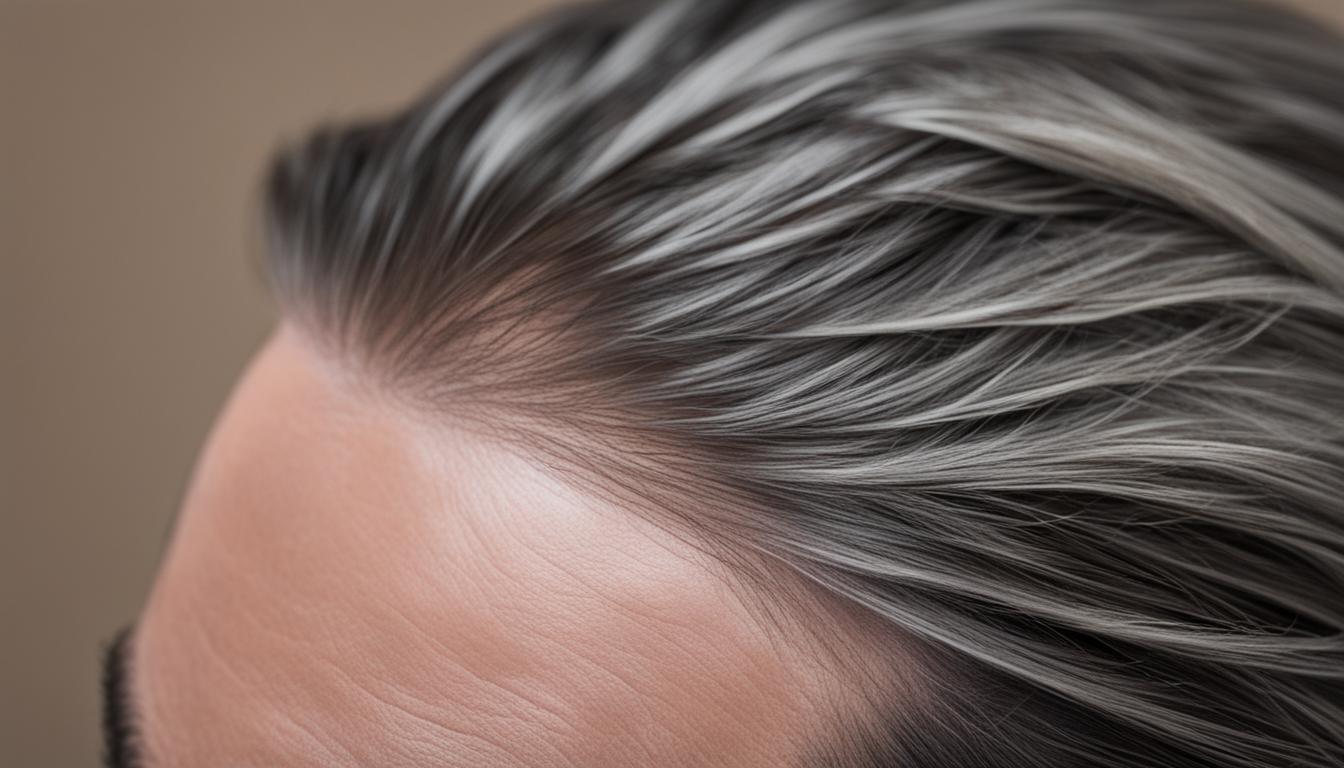Will Hair Grow Back from B12 Deficiency?
Hair shedding and hair loss are common occurrences, but excessive shedding may be a sign of telogen effluvium, which can be caused by stressors like hormonal changes, pregnancy, or illness. While hair shedding is often temporary and resolves on its own, hair loss occurs when the hair follicles stop producing new hair. Hair loss can have various causes, including nutritional deficiencies, autoimmune diseases, and certain medical treatments. One such deficiency that can contribute to hair loss is a deficiency in vitamin B12.
B12 deficiency affects the production of red blood cells, which carry oxygen to the scalp and hair follicles. Without adequate oxygen, the hair may not be able to grow back properly, leading to hair thinning and loss. However, it is important to note that not all hair loss is reversible, and the underlying cause needs to be addressed to determine the appropriate treatment.
Key Takeaways:
- Hair shedding can be a temporary occurrence, but hair loss occurs when the hair follicles stop producing new hair.
- A deficiency in vitamin B12 can contribute to hair thinning and loss by affecting the production of oxygen-rich red blood cells.
- Not all hair loss is reversible, so addressing the underlying cause is essential for effective treatment.
- Maintaining a well-balanced diet that includes essential nutrients is crucial for promoting hair health.
- Working with a healthcare provider is important for accurate diagnosis and personalized treatment of B12 deficiency.
The Role of Nutrition in Hair Health
Nutrition plays a crucial role in maintaining healthy hair. When it comes to hair loss, deficiencies in vitamins and minerals can have a significant impact. Some key nutrients to consider for optimal hair health include:
- Iron: Iron deficiency can lead to thinning hair without proper regrowth. This mineral is essential for producing hemoglobin, which transports oxygen to the hair follicles. Include iron-rich foods like lean meats, beans, and fortified cereals in your diet.
- Zinc and Selenium: Deficiencies in zinc and selenium can also contribute to hair damage and loss. These minerals are involved in hair follicle health and function. Incorporate foods like seafood, nuts, and seeds to ensure an adequate intake.
- Omega-3 Fatty Acids and Vitamin D: Low levels of omega-3 fatty acids and vitamin D have been associated with hair loss. These nutrients help promote a healthy scalp and hair follicles. Include fatty fish, flaxseeds, and fortified dairy products in your diet.
- B Vitamins: B vitamins, including biotin, folate, niacin, riboflavin, and B12, are crucial for healthy hair growth. Deficiencies in these vitamins can contribute to hair loss. Consume foods such as eggs, leafy greens, whole grains, and lean meats to meet your B vitamin needs.
By maintaining a well-balanced diet that includes these essential nutrients, you can support your hair’s overall health and potentially prevent hair loss related to nutritional deficiencies.
The Impact of Nutrition on Hair Loss
Proper nutrition is vital for hair follicle function and hair growth. Without adequate nutrients, hair follicles may become weaker, leading to hair thinning and loss. It’s important to address any nutritional deficiencies to promote optimal hair health. Remember, for specific advice tailored to your individual needs, consult with a healthcare professional or registered dietitian.
Understanding B12 Deficiency and Hair Loss
B12 deficiency can have a significant impact on hair growth and may contribute to hair loss. The deficiency affects the production of red blood cells, which are responsible for carrying oxygen to the scalp and hair follicles. Without sufficient oxygen, the hair follicles may not be able to support proper hair growth, leading to hair thinning and loss. Additionally, B12 deficiency can result in conditions like anemia, nerve damage, and depression, all of which can further contribute to hair loss.
It is important to note that while addressing the B12 deficiency can potentially help stop further hair loss and promote hair regrowth, not all hair loss is reversible. The extent of regrowth may depend on the severity of the deficiency and individual factors. However, restoring adequate levels of B12 is crucial for overall health and can potentially improve hair growth.
Therefore, if you are experiencing hair loss and suspect B12 deficiency may be a contributing factor, it is important to consult with a healthcare provider for a comprehensive evaluation and personalized treatment plan. By understanding the impact of B12 deficiency on hair growth, you can take the necessary steps to address the deficiency and support healthy hair.
The Link Between B12 Deficiency and Hair Growth
Vitamin B12 plays a crucial role in promoting healthy hair growth by facilitating cell division and growth in the hair follicles. It is responsible for the production of oxygen-rich red blood cells, which supply the follicles with the necessary nutrients and oxygen for optimal growth. When B12 levels are low, there is a decrease in cell division, compromised blood flow to the scalp and hair follicles, and potential negative effects on hair follicle health. All of these factors can contribute to hair thinning and loss.
It is important to understand that correcting a B12 deficiency can help restore hair growth. However, the extent of regrowth may vary depending on the severity of the deficiency and individual factors. While B12 deficiency can be a contributing factor to hair loss, it is essential to address the underlying cause of the deficiency and restore adequate levels of the vitamin for optimal results.
“Vitamin B12 is crucial for healthy hair growth due to its role in cell division and the production of oxygen-rich red blood cells.”
Working with a healthcare provider to determine the appropriate treatment approach is essential. This may involve B12 injections, oral vitamin supplements, and dietary changes to ensure adequate intake of this essential nutrient. Animal products such as meat, fish, eggs, and dairy are good sources of B12, while fortified grains and nutritional yeast can provide the vitamin for those following a vegan or vegetarian diet. Maintaining optimal B12 levels through a well-balanced diet and lifestyle factors can help prevent future deficiency and promote overall hair health.
Role of B12 in Hair Follicle Function
In addition to promoting hair growth, vitamin B12 also plays a crucial role in the proper functioning of hair follicles. The vitamin helps ensure that the hair follicles receive the necessary nutrients and oxygen for healthy hair growth. Without adequate B12 levels, the hair follicles may become weak and unable to support optimal growth, leading to hair thinning and loss.
- B12 deficiency can result in compromised blood flow to the scalp and hair follicles.
- Low B12 levels may hinder cell division in the hair follicles, affecting their ability to produce new hair.
- Inadequate B12 can weaken the hair follicles, making them more susceptible to damage and breakage.
Therefore, addressing B12 deficiency is crucial for maintaining healthy hair follicle function and promoting hair regrowth.

Symptoms and Diagnosis of B12 Deficiency
B12 deficiency can manifest with various symptoms that may include fatigue, weakness, pale skin, shortness of breath, numbness and tingling, cognitive changes, and hair loss. These symptoms can be unsettling, but it’s important to note that they can also be indicators of other conditions. To accurately diagnose B12 deficiency and its potential connection to hair loss, it’s crucial to seek a proper medical evaluation.
When diagnosing B12 deficiency, healthcare providers may perform blood tests to measure B12 levels and complete blood counts to check for related indicators. These tests help determine the presence and severity of the deficiency. In some cases, additional tests may be recommended to rule out other possible causes of hair loss. Working closely with a healthcare provider is key to obtaining an accurate diagnosis and developing an appropriate treatment plan.
“An accurate diagnosis of B12 deficiency is vital for understanding its potential impact on hair health.”
Once the diagnosis is confirmed, healthcare providers can develop a personalized treatment plan to address the underlying cause and restore B12 levels. Treatment options may include B12 injections, oral vitamin supplements, and dietary changes. It’s important to note that individual needs may vary, and working with a healthcare provider is essential to determining the most suitable approach.
Key points:
- B12 deficiency can have various symptoms, including hair loss.
- A proper medical evaluation is necessary to accurately diagnose B12 deficiency and its potential connection to hair loss.
- Blood tests and complete blood counts are commonly performed to measure B12 levels and check for related indicators.
- Additional tests may be recommended to rule out other possible causes of hair loss.
- Treatment for B12 deficiency involves addressing underlying causes and restoring B12 levels through injections, supplements, and dietary changes.
Treating B12 Deficiency and Promoting Hair Growth
When it comes to treating B12 deficiency and preventing hair loss, there are a few key strategies to consider. First and foremost, it is important to address the underlying cause of the deficiency. This may involve B12 injections, oral vitamin supplements, or dietary changes. Working closely with a healthcare provider is essential to determine the most suitable treatment approach based on individual needs.
Animal products such as meat, fish, eggs, and dairy are rich sources of B12. For those following a vegan or vegetarian diet, fortified grains and nutritional yeast can also provide the necessary vitamin. Incorporating these foods into your diet can help replenish B12 levels and support overall hair health.
Additionally, maintaining optimal B12 levels through proper nutrition and lifestyle factors is crucial for preventing future deficiency and promoting hair growth. It is recommended to follow a well-balanced diet that includes a variety of nutrients, such as iron, zinc, selenium, omega-3 fatty acids, and vitamin D, which are all important for hair health. Regular exercise, stress management, and adequate sleep also play a role in maintaining healthy hair.
Conclusion
In conclusion, addressing B12 deficiency is crucial for reversing hair loss and promoting hair regrowth. By identifying and treating the underlying cause of B12 deficiency, further hair loss can be halted, and the potential for regrowth can be stimulated. However, it is important to note that the extent of regrowth may vary based on the severity of the deficiency and individual factors.
Additionally, maintaining a balanced diet and lifestyle that supports optimal B12 levels is essential for preventing future deficiency and promoting overall hair health. By incorporating B12-rich foods into your diet, such as meat, fish, eggs, and dairy products, or considering fortified grains and nutritional yeast for those following a vegan or vegetarian diet, you can support your body’s B12 needs.
If you are experiencing hair loss and suspect B12 deficiency may be a contributing factor, it is advised to consult with a healthcare provider for a comprehensive evaluation and personalized treatment plan. They can guide you through the necessary steps to address the deficiency and optimize your chances of reversing hair loss and promoting hair regrowth.
FAQ
Will hair grow back from B12 deficiency?
Proper treatment for B12 deficiency can potentially help stop further hair loss and stimulate hair regrowth. However, the extent of regrowth may vary depending on the severity of the deficiency and individual factors.
What is the role of nutrition in hair health?
Nutrition plays a crucial role in maintaining healthy hair. Deficiencies in vitamins and minerals can contribute to hair loss. It is important to maintain a well-balanced diet that includes nutrients like iron, zinc, selenium, omega-3 fatty acids, vitamin D, and B vitamins for promoting hair health.
How does B12 deficiency contribute to hair loss?
B12 deficiency affects the production of red blood cells, which carry oxygen to the scalp and hair follicles. Without sufficient oxygen, the hair follicles may not be able to support proper hair growth. B12 deficiency can also lead to conditions like anemia, nerve damage, and depression, further contributing to hair loss.
What is the link between B12 deficiency and hair growth?
B12 is essential for healthy hair growth as it facilitates cell division and growth in hair follicles. Without adequate B12 levels, the blood flow to the scalp and hair follicles is compromised, affecting hair follicle health and potentially leading to hair thinning and loss.
What are the symptoms and diagnosis of B12 deficiency?
Symptoms of B12 deficiency can include fatigue, weakness, pale skin, shortness of breath, numbness and tingling, cognitive changes, and hair loss. Diagnosis typically involves blood tests to measure B12 levels and complete blood counts to check for related indicators.
How is B12 deficiency treated and can it promote hair growth?
Treatment for B12 deficiency involves addressing the underlying cause and replenishing B12 levels. This can include B12 injections, oral vitamin supplements, and dietary changes. Correcting the deficiency can help restore hair growth, although the extent of regrowth may depend on the severity of the deficiency and individual factors.
How can I reverse hair loss from B12 deficiency?
Proper diagnosis and treatment of B12 deficiency can help halt further hair loss and potentially stimulate regrowth. Additionally, maintaining optimal B12 levels through proper nutrition and lifestyle factors can help prevent future deficiency and support overall hair health.







